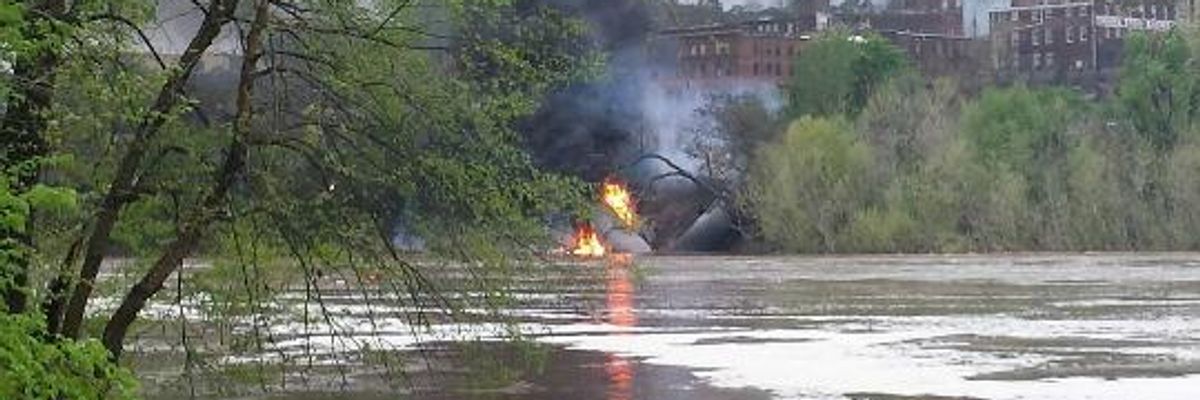The fiery train derailment that struck the town of Lynchburg, Virginia should serve as a wake-up call for the dangers of transporting crude by rail as well as for the need for a renewable transformation, environmental groups charge.
In the incident that took place Wednesday, over a dozen tanker cars derailed, shooting smoke and flames into the sky and sending three of the cars into the James River where they leaked oil, causing a "significant spill" and unknown ecological damage.
The CSX train was carrying Bakken crude from North Dakota and was about 170 west of its destination, Yorktown, Virgina, when the derailment occurred.
It marks the latest in a series of explosive disasters when trains carrying crude oil from the Bakken shale fields of North Dakota derailed.
Just a week before the Lynchburg derailment, railroad industry experts warned at a forum held by the National Transportation Safety Board that none of the train cars traveling through the nation's towns with North Dakota's Bakken crude is safe. That warning came just months after the Pipeline and Hazardous Materials Safety Administration warned that crude from North Dakota's Bakken shale field is "more flammable than traditional heavy crude oil."
"Sadly the crash and fire in Lynchburg isn't a surprise," stated Mollie Matteson, senior scientist at the Center for Biological Diversity's Northeast office in Richmond, Vermont.
"The safest place for dirty fuels is in the ground."
--Glen Besa, Sierra Club Virginia Chapter"Every day trains with tens of thousands of barrels of highly flammable Bakken crude are rumbling through cities and small towns across the country, endangering people, rivers, wetlands and wildlife," Matteson added.
This latest disaster "has got to be a wake-up call for federal authorities to protect people and the environment from these dangerous shipments," she said, because "we can't afford to wait for another train wreck before strong measures are enacted to protect communities, drinking water supplies and natural areas."
Yet the Lynchburg accident points not only to the dangers inherent with transporting this the specific type of crude, by rail or other means.
The disaster "is a potent reminder of the dangers that come with our dependence on dirty fuels and reinforces the need for better safety measures and increased emergency preparedness," stated Sierra Club Virginia Chapter Director Glen Besa.
"In the wake of this and other recent dirty fuel disasters it's clear that we must move as quickly as possible to safer, cleaner forms of energy like wind and solar. The safest place for dirty fuels is in the ground."
_________________________________________

